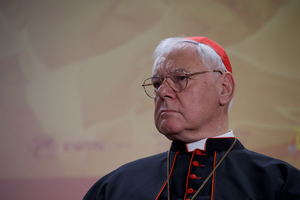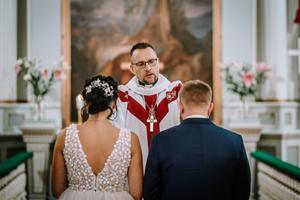Imams Decry Islamic Violence
Recent attacks in Europe spur response.

VATICAN CITY — After the recent Islamist attacks in Britain and other parts of Europe, an increasing number of people — including some prominent Muslims and imams — are challenging the religion and the violence with which it has long been associated.
Following the attacks at London Bridge on June 3, in which eight people were killed and 48 injured — in the third major Islamist terrorist incident in Britain this year — 500 British imams and Muslim religious leaders refused to perform funeral prayers for the terrorists.
The imams said they made the decision to show that radicalization does not come from the teachings of Islam and was aimed at being a deterrent.
It follows an earlier, separate statement, signed by almost 200 imams and religious leaders from the Muslim Council of Britain, which similarly refused to offer funeral prayers for the terrorists.
U.S. Secretary of State Rex Tillerson said he was “encouraged” by the initiative, as it meant the imams are “condemning their souls.” He said it is something “that has to be done, and only the Muslim faith can handle this.” (Some reports decried the imams’ initiative as a misleading PR exercise because withholding funeral prayers is allegedly an honor for jihadist “martyrs,” but the imams deny this, stressing the Islamic State group, or ISIS, is not following the rules of lawful warfare. They are not performing jihad and so are not accepted in the Muslim community, either in life or death).
The British Muslim Forum (BMF), which was behind the later initiative, is further encouraging mosques to challenge “the perverted interpretation of Islam that is put forward by ISIS and other extremist groups.”
It said it also aims to broadcast a message that violent extremism is “forbidden” by Islam.
‘A Dark and Godless Place’
“If you follow this path, you are stepping away from Islam to a dark and Godless place,” Qari Asim, BMF’s spokesman, told the Independent newspaper June 7. “Your views are not welcome in our mosques or in our communities. This is not a path to heaven.”
But other, more well-known Muslims are taking a slightly harder line, daring to say that Islam has a problem with violence.
After the London Bridge attacks, Maajid Nawaz, a former member of the U.K. branch of the hardline Islamist group Hizb ut-Tahrir, called on British Muslims to “stop pretending” violence and terrorism are completely alien to Islam.
Now a broadcaster on London’s LBC radio, Nawaz answered a Muslim caller June 4 who questioned whether Islam had anything to do with terrorism.
“When the prophet Muhammad said: ‘I have been ordered to fight the people until they declare there is no god but God and Muhammad is his messenger,’ that’s clearly got something to do with violence doesn’t it?” Nawaz suggested.
He went on to explain why he believes the link must be first acknowledged and then understood, because “when listeners hear Muslims like yourself say it’s got nothing to do with it, they think that you’re trying to shirk responsibility and sidestep the very important task that faces all of us: to challenge extremism within our mosques and our communities.”
Confronting Muslim Extremists
Nawaz voiced similar concerns before: In 2016, he said the “Islamist ideology” needs to be named and challenged, and under then-U.S. President Barack Obama, that was “simply just not happening.”
The United Arab Emirates’ foreign minister, Sheikh Abdullah bin Zayed Al Nahyan, recently made a similar plea to confront extremist Muslims. During a television panel in May on Bloomberg television, he warned there will “come a day when we will see far more radical extremists and terrorists coming out of Europe because of a lack of decision-making and trying to be politically correct, or assuming that they know the Middle East, they know Islam and the other far better than we do.”
“I’m sorry,” he said, “that’s just pure ignorance.”
His comments followed those of Egyptian President Abdel-Fattah el-Sissi who, two years ago at Al Azhar University, the center of learning for Sunni Islam, regretted that some of his co-religionists were becoming “a source of worry, fear, danger, murder and destruction to all the world.”
Like other Muslim government leaders — even Saudi Arabia’s — el-Sissi has taken measures to limit extremism and curb Islamist preachers.
More recently, Wael Farouq, a Muslim Egyptian professor of linguistic studies at the Catholic University of Milan, wrote in the Italian bishops’ newspaper Avvenire that Western governments “only fight the symptoms of the disease.”
If you want to “prevent these rivers of blood,” he wrote June 4, then Islamic doctrine “must be purified from the interpretations that lead people of the Muslim faith to embrace terrorism.”
Long-Standing Issue
The issue of Islam and violence is a long-standing and complex one.
Muslim apologists often stress that the religion was born into a violent, tribal setting, influencing how Islamic scripture was written.
They also argue that, in the absence of a centralized authority, Islamists can too easily misinterpret those passages, thereby “hijacking” the religion.
According to Asim, all faiths are sent by God to guide mankind in peaceful coexistence, but their scriptures can be misinterpreted. ISIS and their affiliates, he told the Register June 12, are therefore “presenting a distortion, a very perverted ideology of Islam.”
He asserted that violent passages in the Quran, such as, “Kill the unbelievers wherever you find them” (2:191), need to be read in context, as the text was written after two parties broke a treaty and were at war with each other.
He also pointed out that later verses say that “if the other side is inclined to make peace, then do make peace; do not transgress the boundaries of God.”
Asim, who is an imam at a mosque in Leeds, England, stressed that to apply those passages literally and out of context today “goes against the grain of history since, historically, Muslims and other communities have lived together, shared governments together, have a rich history that otherwise wouldn’t have been possible.”
He added that if the world’s 1.7 billion Muslims believed what the terrorists believe in, “the world would be in a very different place to what it is now.”
Inherent Problem
But Greek Melkite Father Henri Boulad has no doubt that Islam has an inherent problem with violence, regardless of whether its scriptures are taken out of context.
The Jesuit Egyptian scholar of Islam argues that the religion is inextricably linked with politics, Islamism is merely political Islam, and jihad is not a marginal aspect of the religion, but an obligation of the believer.
In June 10 comments to the Register, Father Boulad, who is a relative of the Jesuit scholar on Islam, Father Samir Khalil Samir, listed 11 verses from the Quran, eight examples from Muhammad’s teachings and life, and Islam’s own history as evidence that violence is an integral part of the religion.
Asked if extremists are simply being faithful to an authentic Islam, Father Boulad replied: “Clearly, yes. Extremists are just applying what their religion teaches them to do.”
So sure is he of this view that he has written to Pope Francis to warn him against political correctness by defending Islam “at all costs” and “seeking to exonerate it from the horrors committed every day in its name.”
By doing so, he said, “one ends up betraying the truth.”
It is “high time,” in the face of Islamist attacks, that the Church emerges “from a shameful and embarrassed silence,” he said. “A systematically conciliatory attitude is interpreted by the majority of Muslims as a sign of fear and weakness.”
On the possibility that Islam can be reformed to root out the violence with which it has long been associated, Asim did not think a Protestant-style Reformation was possible, but instead stressed the importance of “contextualizing Islam in Britain” — a kind of Islamic inculturation.
As generations settle, he said, they must become “confident of their religious and national identity,” as well as educated about the proper context of “difficult passages” in the Quran.
That means “proactively” focusing on the understanding that there is “no inherent conflict between being a Muslim and a Brit” and “cherishing the values we have in Britain: the rule of law, democracy, justice and tolerance,” he said.
Unsuccessful Efforts at Reform
Father Boulad similarly rejected the possibility of Islam being wholly reformed, but for him it is because all previous attempts to do so by “open-minded” Muslims have “tragically failed so far,” and he listed six unsuccessful efforts over the past two centuries.
He also doubted that a “reformed Islam” would still remain “Islam.”
But even if the propensity for violence cannot be rooted out in the religion, Father Boulad and others believe the religion can still help in acting as a bulwark against secularist ideologies.
When it comes to such ethical issues, the Church “should ally with Muslims to fight against whatever demeans and degrades the human being,” Father Boulad said.
“This is a fertile ground of understanding between the two religions,” the Melkite priest added. “It can also pave the way to us for denouncing anything which is morally unacceptable in the Islamic teachings.”
Edward Pentin is the Register’s Rome correspondent.
- Keywords:
- edward pentin
- islam
- islamic violence
- terrorism


















